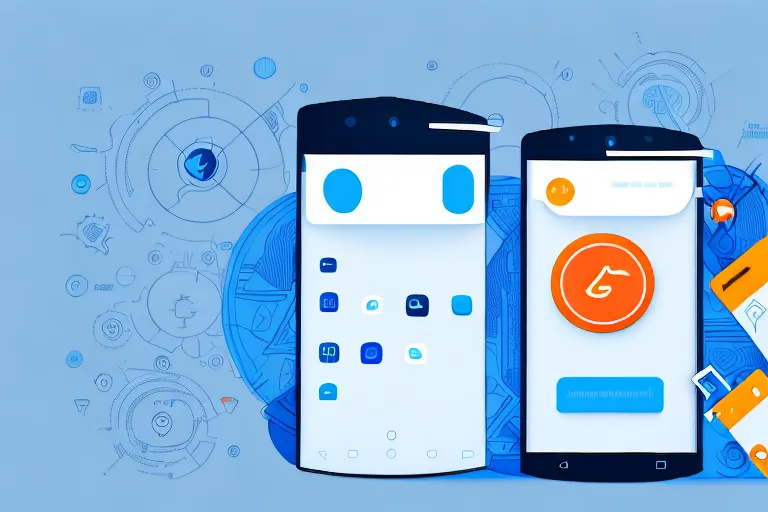RCS Business Messaging: Unleashing the Power of Android Enterprise for Marketing

As technology continues to evolve, so does the way businesses communicate with their customers. One of the latest developments in this field is Rich Communication Services (RCS) Business Messaging. With its advanced features and capabilities, RCS is quickly becoming the future of mobile marketing. In this article, we'll explore what RCS Business Messaging is, how it can be used for marketing, and some success stories of brands that have implemented it.
Understanding RCS Business Messaging
As businesses continue to expand and evolve, they are constantly looking for new ways to communicate with their customers. One of the most exciting developments in recent years has been the introduction of RCS Business Messaging. This innovative messaging service has revolutionized the way businesses interact with their customers, offering a more engaging and interactive experience than traditional SMS messaging.
What is RCS Business Messaging?
RCS Business Messaging is a type of SMS messaging that utilizes advanced features such as rich media support, interactive elements, and chatbot integration to enhance the customer experience. This means that businesses can send messages that include images, videos, and other multimedia content, as well as interactive elements like buttons and menus that allow customers to take action directly from the message. Additionally, businesses can integrate chatbots into their RCS messages, providing customers with quick and easy access to information and support.
The Evolution of RCS and Its Impact on Business Communication
The development of RCS Business Messaging has been a long and exciting journey. RCS was first introduced in 2008 as an upgrade to SMS messaging. Its goal was to provide a richer and more interactive experience for users. However, it wasn't until 2016 that Google announced that they would be launching a new messaging platform called Android Messages, which would include support for RCS. This move marked a significant shift in the way that businesses could communicate with their customers.
With RCS, businesses could send messages with advanced features like rich cards, carousels, and suggested replies. This allowed them to provide a more engaging and interactive experience for their customers, while also making it easier for customers to take action directly from the message. For example, a restaurant could send an RCS message that includes a menu with pictures of their dishes, allowing customers to quickly and easily place an order without ever leaving the message.
RCS vs. SMS: Key Differences and Advantages
While both RCS and SMS are messaging services, there are several key differences between the two. First, as previously mentioned, RCS supports rich media and interactive elements, which makes it a more engaging form of communication. This means that businesses can create messages that are more visually appealing and interactive, which can help to capture the attention of their customers and increase engagement.
Second, RCS has higher character limits than SMS, which allows businesses to send more detailed messages. This is particularly important for businesses that need to convey complex information or provide detailed instructions to their customers.
Finally, RCS messages are sent through data networks rather than SMS networks, which means they are more reliable and offer better security. This is because data networks are more resilient than SMS networks, and are less susceptible to issues like network congestion or message delays.
Overall, RCS Business Messaging represents a significant advancement in the way that businesses communicate with their customers. By providing a more engaging and interactive experience, RCS can help businesses to build stronger relationships with their customers and drive better results.
Implementing RCS Business Messaging for Marketing
Setting Up RCS Business Messaging for Your Organization
If you're interested in using RCS for marketing purposes, the first step is to set up an RCS Business Messaging account. To do this, you will need to work with a provider who is authorized to offer RCS services. There are several providers available in the market, such as Google's Business Messages, Infobip, Twilio, and more. These providers will help you set up your account and provide the necessary tools to create and send RCS messages to your customers.
Setting up your RCS Business Messaging account is a straightforward process. You will need to provide some basic information about your organization, such as your business name, website, and contact information. You will also need to verify your account to ensure that you are a legitimate business.
Once you have an account, you can start creating and sending RCS messages to your customers. RCS messages are similar to SMS messages, but they offer more features and capabilities. For example, RCS messages can include rich media elements like images, videos, and GIFs, as well as interactive elements like buttons and carousels.
Creating Engaging RCS Marketing Campaigns
One of the key advantages of RCS is that it allows businesses to create more engaging and interactive marketing campaigns. With RCS, businesses can create visually appealing messages that capture their customers' attention and drive engagement. For example, businesses can use high-quality images and videos to showcase their products or services, or use GIFs to add a touch of humor or personality to their messages.
In addition to rich media elements, businesses can also incorporate interactive elements into their RCS messages. For example, they can use buttons to allow users to easily take action, such as making a purchase or scheduling an appointment. They can also use carousels to showcase multiple products or services, allowing users to explore different options without leaving the messaging app.
By creating engaging and interactive RCS marketing campaigns, businesses can increase customer engagement and drive more conversions.
Personalizing Customer Experiences with RCS
RCS also allows businesses to personalize their messages to make them more relevant to individual customers. Personalization is a powerful tool for increasing customer engagement and building brand loyalty.
One way businesses can personalize their RCS messages is by using chatbots. Chatbots are automated messaging tools that can provide personalized recommendations based on a customer's browsing or purchase history. For example, if a customer has recently purchased a pair of shoes, a chatbot can recommend complementary products like socks or shoe polish.
Another way businesses can personalize their RCS messages is by using location data. By using the customer's location data, businesses can offer promotions or discounts to customers who are near their physical store locations. For example, a restaurant could send a message offering a discount to customers who are within a certain distance of their location.
By personalizing their RCS messages, businesses can create more meaningful and relevant experiences for their customers, increasing engagement and building brand loyalty.
RCS Business Messaging Features and Capabilities
Rich Communication Services (RCS) is an advanced messaging protocol that allows businesses to communicate with their customers in a more engaging and interactive way. With RCS, businesses can deliver rich media messages, chatbot integration, and advanced analytics and performance tracking capabilities.
Rich Media Support and Interactive Elements
One of the key features of RCS is its support for rich media and interactive elements. This allows businesses to create more engaging and interactive messages for their customers. By using images, videos, and GIFs, businesses can make their messages more visually appealing and attention-grabbing. They can also use interactive elements like buttons and carousels to allow users to explore their products or services in a more interactive way.
For example, a clothing store could use RCS to send a message to a customer about a new line of clothing. The message could include images of the clothing, as well as interactive elements that allow the customer to browse different styles and colors.
Chatbot Integration and Automation
RCS also supports chatbot integration and automation. This allows businesses to provide personalized recommendations and support to their customers without the need for human intervention. Chatbots can provide answers to frequently asked questions, help customers complete purchases or bookings, and even make personalized recommendations based on the customer's preferences and purchase history.
For example, a travel agency could use RCS to send a message to a customer about a vacation package. The message could include a chatbot that helps the customer select the right package based on their preferences and budget.
Analytics and Performance Tracking
RCS also offers advanced analytics and performance tracking capabilities. Businesses can track important metrics like message delivery rates, open rates, and click-through rates. This allows them to measure the effectiveness of their messaging campaigns and make adjustments as needed.
For example, a restaurant could use RCS to send a message to customers about a new menu item. By tracking the open and click-through rates of the message, the restaurant can determine how effective the message was in driving customer engagement and interest in the new menu item.
In conclusion, RCS provides businesses with a powerful tool for communicating with their customers in a more engaging and interactive way. By leveraging rich media support, chatbot integration, and advanced analytics and performance tracking capabilities, businesses can create messaging campaigns that are more effective and personalized to their customers' needs.
RCS Business Messaging Use Cases and Success Stories
Retail and E-commerce
Many retail and e-commerce businesses have started using RCS to enhance their marketing efforts. For example, businesses can use RCS to send personalized product recommendations, provide updates on order status, and offer discounts or promotions to customers who have abandoned their cart.
Travel and Hospitality
Travel and hospitality businesses can also benefit from using RCS. For example, hotels can use RCS to send check-in instructions to guests before they arrive, offer local recommendations for sightseeing, and send updates on flight schedules or delays to travelers.
Financial Services and Banking
Financial services and banking companies can also use RCS to communicate with their customers. For example, banks can use RCS to send updates on account balances or recent transactions, offer fraud alerts, and provide customers with personalized investment recommendations.
Conclusion
RCS Business Messaging is a powerful tool for businesses that want to communicate with their customers in a more engaging and interactive way. With its support for rich media and interactive elements, chatbot integration and automation, and advanced analytics and performance tracking capabilities, RCS is quickly becoming the future of mobile marketing. By implementing RCS, businesses can offer personalized experiences to their customers, increase engagement, and drive more sales.
